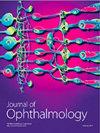使用 AS-OCT 分析评估从 PACS 进展到 APAC 风险的指标以及 APAC 的眼压升高程度。
IF 1.9
4区 医学
Q3 OPHTHALMOLOGY
引用次数: 0
摘要
目的本研究旨在量化前房参数,为评估原发性闭角可疑(PACS)眼发展为急性原发性闭角(APAC)提供潜在的风险指标,并利用前段光学相干断层扫描(AS-OCT)评估APAC患者的眼压升高程度。方法使用托米 CASIA2 AS-OCT 定量测量各种前房参数,包括前房深度 (ACD)、前房容积 (ACV)、晶状体厚度 (LT)、晶状体穹窿 (LV)、虹膜-蝶鞍接触指数(ITC)、虹膜厚度(IT)、虹膜体积(IV)、虹膜曲率(IC)、虹膜面积(IA)和虹膜厚度(IT)。结果与 PACS 组相比,APAC 组的 IA 和 IC 明显较小,瞳孔直径 (PD) 和 ITC 明显较大(P < 0.05)。两组在 ACV、ACD、ACW、ACA、LV、IV 和 IT750/2000 方面的差异无统计学意义。在 APAC 眼睛中,多变量线性回归分析显示眼压与 IV 之间存在显著负相关(β = -1.85; 95% 置信区间:-2.77 至 -0.93;P=0.001),而在 PACS 眼睛中则没有发现相关性。在所有 60 眼中,LT 与 ACV、ACD、ACA 和鼻腔 IT750 呈负相关,与 LV 和鼻腔 IC 呈正相关。IA 可作为 PAC 或 APAC 病变进展的预测指标。在 APAC 发作期间,眼压与 IV 之间存在明显的负相关。LT可被视为原发性闭角疾病发生的预测因素。本文章由计算机程序翻译,如有差异,请以英文原文为准。
Analysis of Indicators for Assessing the Risk of Progression from PACS to APAC and the Degree of Intraocular Pressure Elevation in APAC Using AS-OCT.
Objective
The aim of this study is to quantify anterior chamber parameters to provide potential risk indicators for evaluating the progression of primary angle-closure suspect (PACS) eyes to acute primary angle closure (APAC) and the degree of intraocular pressure elevation in patients with APAC utilizing anterior segment optical coherence tomography (AS-OCT).
Methods
Tomey CASIA2 AS-OCT was used to quantitatively measure various anterior chamber parameters, including anterior chamber depth (ACD), anterior chamber volume (ACV), lens thickness (LT), lens vault (LV), iris-trabecular contact index (ITC), iris thickness (IT), iris volume (IV), iris curvature (IC), iris area (IA), and iris thickness (IT), in APAC eyes (30 eyes) and contralateral PACS eyes (30 eyes) of 30 patients. The differences in these parameters between the two groups and their relationship with intraocular pressure were analyzed.
Results
Compared to the PACS group, the APAC group exhibited significantly smaller IA and IC, and significantly larger pupil diameter (PD) and ITC (P < 0.05). There were no statistically significant differences in ACV, ACD, ACW, ACA, LV, IV, and IT750/2000 between the two groups. In APAC eyes, multivariable linear regression analysis showed a significant negative correlation between intraocular pressure and IV (β = -1.85; 95% confidence interval: -2.77 to -0.93; P=0.001), while no correlation was found in PACS eyes. In all 60 eyes, LT showed a negative correlation with ACV, ACD, ACA, and nasal IT750, and a positive correlation with LV and nasal IC.
Conclusion
AS-OCT has multiple advantages in evaluating various anterior chamber parameters in patients with glaucoma. IA may serve as a predictive indicator of the progression of eyes from PAC or APAC. A significant negative correlation was found between intraocular pressure and IV during APAC attacks. LT can be considered a predictive factor for the occurrence of primary angle-closure disease.
求助全文
通过发布文献求助,成功后即可免费获取论文全文。
去求助
来源期刊

Journal of Ophthalmology
MEDICINE, RESEARCH & EXPERIMENTAL-OPHTHALMOLOGY
CiteScore
4.30
自引率
5.30%
发文量
194
审稿时长
6-12 weeks
期刊介绍:
Journal of Ophthalmology is a peer-reviewed, Open Access journal that publishes original research articles, review articles, and clinical studies related to the anatomy, physiology and diseases of the eye. Submissions should focus on new diagnostic and surgical techniques, instrument and therapy updates, as well as clinical trials and research findings.
 求助内容:
求助内容: 应助结果提醒方式:
应助结果提醒方式:


